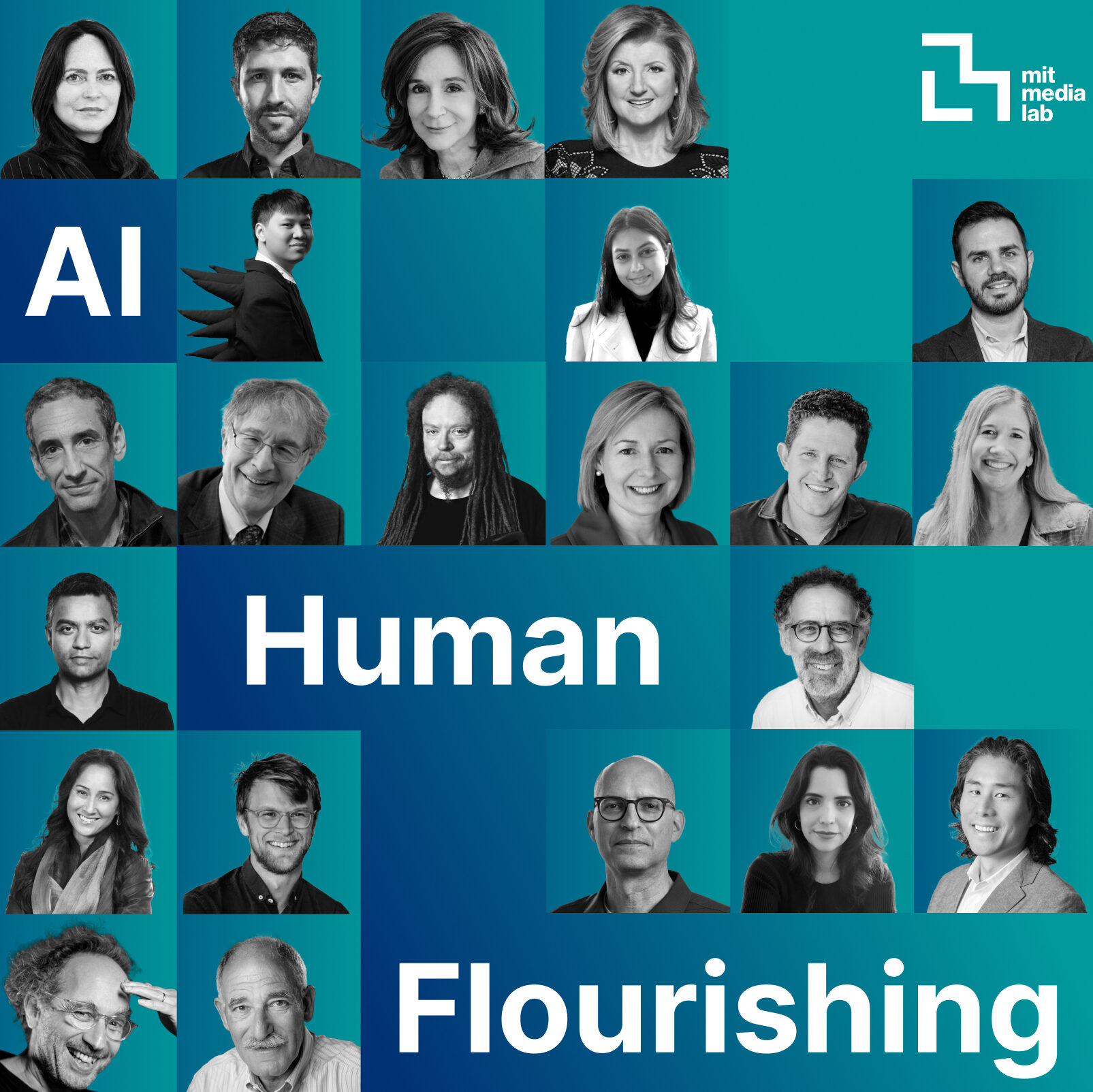As AI advances, will people advance as well?
AI is not just an engineering challenge, it is also a human design problem. For AI to live up to its lofty expectations and benefit humankind, it is important that we not just optimize AI itself and make it more accurate, safe and unbiased, but that we also understand how people respond to interaction with AI and how we best design that interaction so people and humanity benefit.
The Advancing Humans with AI program (AHA) is a multi-faculty initiative that aims to understand the human experience of pervasive AI and design the interaction between people and AI to foster human flourishing. The program creates a new research endeavor around Human-AI interaction, informed by a deep understanding of human needs and behavior. By closely collaborating with AI developers and other stakeholders in a culture of prototyping and experimentation, we aim for this research to have real world impact and move AI deployments in a positive direction. The program is neither overly optimistic nor pessimistic about AI; rather, we focus on understanding how to design and implement AI that enhances the human experience.

AHA Symposium 2025:
Can we design AI to support human flourishing?
A 1-day symposium to launch the AHA research program
Thursday April 10, 2025 | 9:00am — 5:30pm ET
MIT Media Lab, E14 – Floor 6
75 Amherst Street, Cambridge, MA
The MIT Media Lab’s Advancing Humans with AI (AHA) is excited to announce its inaugural symposium with a goal of discussing what is arguably one of the most important questions of our time: What future with AI do we want to live in and how can we design and deploy AI that improves the human experience?
*In person attendance is upon invitation only, but the symposium will be streamed
Why this program?
We are in a period of rapid development in AI, with most of that development happening in industry rather than academia. Developers of foundational AI models and applications are in a race to reach AGI, spending most of their energy and attention on engineering challenges and optimization of AI models. While they are focused on issues such as improving accuracy, efficiency, safety and reducing bias, they devote less attention to understanding how people respond to interacting with seemingly intelligent systems and how to best design models, interfaces and applications to maximize desired human outcomes.
Having AI at one’s fingertips could lead to overreliance, manipulation
and misinformation, dependence and loss of skills, as well as unhealthy emotional attachments and weaker social networks. In addition, many fear AI may lead to negative mental health outcomes and societal disruption as people gradually are surpassed by AI in the highest intellectual endeavors including creativity, reasoning, discovery and problem solving.
The AHA program aims to understand people’s responses to AI in the shorter and longer term, with the aim of designing AI such that people maintain agency and meaning as well as healthy social networks. While related non-profit organizations have been created to study the ethics of AI, AI safety issues, and to develop open AI models and resources, to our knowledge there is no significant effort dedicated to understanding the impact of AI on people’s social, emotional and intellectual wellbeing.
Research Focus
The goals of the AHA program are ambitious and multifaceted. We aim to establish a new research field and community dedicated to the study of human augmentation with AI.
Our Methods
In pursuit of this goal, we promote the following three methods of inquiry:

Inspire
potential futures and applications: Design and deployment of novel AI experiences that augment people and their ability to unlock their full potential.

Invent
new models, methods and interfaces that elevate people: Develop novel methods and techniques for interaction with AI that increases human capabilities, agency, and flourishing.

Investigate
positive and negative impact of AI use: Study how design choices for interactive AI affect people’s behavior and experience, both positively and negatively.
Our core research question:
How can we design AI for human thriving?
We aim to address this question in a comprehensive way, tackling topics such as:
Curiosity & Learning
How can AI inspire curiosity and strengthen learning?
Creativity & Expression
How can we support human creativity and expression in a world of AI?
Comprehension, Reasoning & Agency
How can we support human comprehension, reasoning, and agency in a world of AI?
Sense of Purpose
How can we support a sense of purpose and meaning in a world with AI?
Emotional Wellbeing
How can AI strengthen emotional wellbeing?
Healthy Social Lives
How can individuals maintain healthy social lives in an era of AI?
Program pillars
Through a series of activities, the initiative aims to raise awareness and foster collaboration, innovation, and understanding in this rapidly evolving field.

Research
Development and deployment of novel human-AI interactive technologies, experiences and applications that augment people by providing wisdom, wonder and supporting their wellbeing.

Annual symposium
This event will bring together leading experts, researchers, and industry professionals to discuss the latest advancements and challenges in human-AI interaction.

Focused Workshops
These intimate, hands-on sessions will delve into specific areas of AI and human interaction, providing participants with practical skills and deeper insights.

Speaker Series
The initiative will sponsor a hybrid speaker and interview series featuring key researchers and thought leaders.

Social media accounts
Regular updates of both shorter and longer formats will keep the community abreast about the latest news, research findings, and events related to human-AI interaction.

Leadership
- Pattie Maes, co-lead of the AHA program, Germeshausen professor of Media Technology and director of the Fluid Interfaces group, has 30+ years of expertise in research at the intersection of AI and human-computer interaction. Maes’ group focuses on design of AI systems that augment decision making, learning, health and wellbeing.
- Pat Pataranutaporn, co-lead of the AHA program, MIT Media Lab postdoctoral researcher in the Fluid Interfaces group. Pat’s research lies at the intersection of AI and human-computer interaction, where he develops and studies AI systems that support human flourishing.
- Andrew Lippman, Senior research scientist, Director of the Viral Communications group & Associate Director of the MIT Media Lab
- Cynthia Breazeal, Professor at the MIT Media Lab, Director of the Personal Robots group, MIT Dean for Digital Learning
- Paul Liang, Assistant Professor at the MIT Media Lab and MIT EECS, Director of the Multisensory Intelligence research group
- Hiroshi Ishii, Professor and Associate Director at the MIT Media Lab, Director of the Tangible Media group
- Deb Roy, Professor at the MIT Media Lab, Director of MIT’s Center for Constructive Communication
- Tod Machover, Professor at the MIT Media Lab, Director of the Opera of the Future Group
- Mitchel Resnick, Professor at the MIT Media Lab, Director of the Lifelong Kindergarten group
- Joseph A. Paradiso, Professor at the MIT Media Lab, Director of the Responsive Environment group
- Rosalind Picard , Grover M. Hermann Professor in Health Sciences and Technology and director of the Affective Computing Group, has 30+ years of expertise in research related to AI, wearables, and human health and wellbeing. Picard’s group focuses on innovative solutions to help people who are not flourishing or at risk of not flourishing.
- Ramesh Raskar, Associate Professor of Media Arts and Sciences, Director of Camera Culture Group.
- Kent Larson, Professor of the Practice, Director of City Science Group.
- Behnaz Farahi, Assistant Professor of Media Arts and Sciences, Director of Critical Matter group
- Zach Lieberman, Adjunct Associate Professor of Media Arts and Sciences, Director of Future Sketches group
- Dava Newman, Director of the MIT Media Lab & Apollo Program Professor of Astronautics chair at MIT
AHA Team
- Pattie Maes, co-lead of the AHA program, Germeshausen professor of Media Technology and director of the Fluid Interfaces group, has 30+ years of expertise in research at the intersection of AI and human-computer interaction. Maes’ group focuses on design of AI systems that augment decision making, learning, health and wellbeing.
- Pat Pataranutaporn, co-lead of the AHA program, MIT Media Lab postdoctoral researcher in the Fluid Interfaces group. Pat’s research lies at the intersection of AI and human-computer interaction, where he develops and studies AI systems that support human flourishing.
- Auren Liu, Graduate Student (HST)
- Valdemar Danry, MIT Media Lab
Support AHA
This fund supports groundbreaking research and external collaborations across MIT and beyond, catalyzing interdisciplinary projects that address critical issues in AI’s impact on how we work, learn, socialize, communicate, and stay well. Under the guidance of the AHA program leads and the AHA advisory council, funding is directed toward:
New research projects
Supporting pioneering studies that investigate, invent and inspire critical issues in the human-AI experience.
Workshops
Enabling the convening of experts and stakeholders from industry, academia and the government to collaborate on specific challenges and produce guidelines, benchmarks and recommendations for the development and deployment of AI that benefits people.
Annual symposium and speaker series
Supports the organization of our annual conference as well as our online speaker series to raise awareness around the issues of Human AI interaction and share our findings and recommendations with the widest audience possible.
Student fellowship opportunities
Ensures that we can grow our group of researchers and tackle more of the important questions and problems. It also results in well rounded students who upon graduation join the private or public sector where they can further influence AI development in ways that benefit people.
Donors of student fellowship funds can direct their support to the AHA research areas they are most passionate about, e.g. mental health, learning, creativity, and more.
Focused research projects
Enables collaboration between the donor and Media Lab researchers on a specific study or research project based on shared interests. Involves a statement of work and list of deliverables.
Endowed faculty chairs
Creates opportunities to establish named, endowed faculty positions dedicated to research and in AI that advances people.
Be Part of Advancing Humans with AI
Join AHA and become part of a community advancing human flourishing with AI. Through your support, we hope to advance awareness and real-world solutions for benefiting people with AI.The AHA program is structured to foster open collaboration and innovation while empowering supporters to direct some of the research and be more closely involved with our research. Corporations, foundations, and individuals have multiple opportunities to support the program and get involved:
AHA Council Membership (donations of $250K+)
Council members play a pivotal role in advancing the AHA mission, enjoying exclusive opportunities to engage deeply with the Media Lab’s innovative work:
Exclusive invitations
- Attend bi-annual Media Lab member events to connect with visionary thinkers and witness the latest innovations.
- Join the annual AHA symposium for groundbreaking updates and insights.
- Participate in semi-monthly invited speaker seminars, to explore the latest research related to AI’s impact on the human experience.
Insight and access
- Access to strategic intellectual property opportunities.*
- Explore active initiatives, ongoing projects, and daily updated research publications through comprehensive access to Media Lab resources.
- Attend in-person or virtual workshops hosted by the Media Lab for deeper exploration of transformative ideas.
Collaboration Opportunities
- Provide input on the research agenda and recommendations alongside the faculty leads.
- Participate in research through a Focused Research Project, supporting collaboration opportunities on a specific jointly-defined project.
- Support either AHA as a whole or a specific AHA research theme by funding a graduate student in an area of interest, for example, advancing learning with AI, advancing mental health with AI and more.
Collaboration Opportunities
- Connect with the dynamic E14, Media Lab, and MIT startup ecosystems, fostering entrepreneurial opportunities.
- Stay engaged with the vibrant Media Lab community through broad access to online programming.
Catalysts (donations between $50K and $250K)
Catalysts are essential supporters whose contributions sustain AHA and provide meaningful connections to its work:
Selective invitations
- Attend one Media Lab member event annually to experience interdisciplinary Innovation.
- Join the annual AHA symposium for insights into the program’s impactful initiatives.
Access and engagement
- Stay informed through the AHA Email updates.
- Participate in semi-monthly invited speaker seminars for insights into emerging topics.
Discovery opportunities
- Explore the Media Lab’s research ecosystem with daily updates on projects and publications.
Gifts of all sizes are accepted and valued greatly. For more information: contact aha@media.mit.edu.
Get involved
The AHA program is structured to foster open collaboration and innovation while empowering supporters to direct some of the research and be more closely involved. Corporations, foundations and individuals have multiple opportunities to support the program and get involved:
- Support for the overall AHA program through an unrestricted gift ensures that the AHA program can thrive and that we can broaden our research and share our findings with the widest audience possible.
- Support for student fellowships ensures that we can grow our research community and tackle more of the questions and themes. It also results in well rounded graduates who upon graduation join the private or public sector where they can further influence AI development in ways that benefit people. Donors of student fellowship funds can direct their support to the research themes they are most passionate about.
- Support for focused research projects: Supporters can choose to fund and collaborate on a specific study or research project based on their interests.
- Media Lab member companies have access to all AHA program activities and research and are encouraged to get involved more closely through one of the options above.
For more information: contact aha@media.mit.edu.



